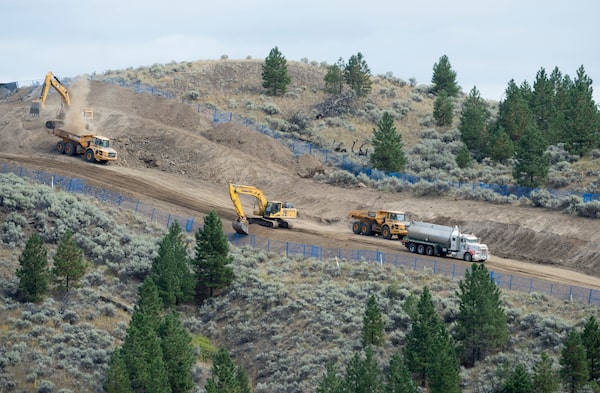
Construction of the Trans Mountain pipeline is seen under way in Kamloops, B.C., on Sept. 1, 2020.JONATHAN HAYWARD/The Canadian Press
The Trans Mountain pipeline carried a record-breaking amount of oil to British Columbia from Alberta in August, despite persistent price and demand woes gripping the energy sector as the COVID-19 pandemic drags on.
The federally owned pipeline carried an average of 350,000 barrels of crude and refined products a day last month, bringing in revenue of $31.5-million. Trans Mountain Corp. president and chief executive Ian Anderson attributed the windfall to an uptick in demand for transportation fuels, which resulted in more gasoline and diesel moving through the system.
“We have been full every day during the COVID period. Demand for the pipeline has not softened at all,” he told The Globe and Mail in an interview Tuesday.
But the viability of expanding Trans Mountain is being questioned by a group of more than 100 Canadian economists and resource policy experts.
The group is urging the federal government to hit pause on the project and undertake a new and independent cost-benefit analysis to determine if the $12.6-billion expansion, referred to as TMX, remains financially viable and in the public interest.
Doing so could free up billions of dollars to redirect to “more reliable forms of stimulus and job creation," the group argued in an open letter to Prime Minister Justin Trudeau and three of his cabinet ministers.
“We are concerned that the decline in world oil markets and the escalating construction costs [of the expansion] have undermined the viability of TMX and put taxpayers' money at risk,” the letter says, adding Ottawa has failed to justify its investment in light of deteriorating conditions in the energy sector.
Energy giant BP on Monday predicted that fossil fuel consumption will shrink for the first time in modern history, with peak oil demand now likely in the world’s rearview mirror as countries pivot toward renewable forms of power and pursue low-carbon energy in the face of climate change.
That doesn’t worry Mr. Anderson, who believes the pipeline’s connections to the Pacific Northwest, California and global markets from shipping docks in B.C. mean it – and its expansion – will remain crucial infrastructure.
“We provide flexibility into markets where shippers will be able to take advantage of where demand still exists, and we’re confident that for decades to come, we’re going to be in a good position,” he said.
The Trans Mountain expansion project twins the current pipeline, increasing capacity to 890,000 barrels a day. It has faced a swath of regulatory and legal hurdles since it was proposed in 2013. Those culminated in the federal government buying the pipeline from then-owner Kinder Morgan in 2018, mere months before the Federal Court of Appeal overturned the Trudeau government’s approval of the expansion in August that same year, ruling Indigenous consultation and environmental reviews were substandard.
In February, 2019, the National Energy Board recommended cabinet once again approve the project subject to 16 new conditions. Cabinet followed the advice in June that same year.
That wasn’t the end of challenges to the project. Both the Federal Court of Appeal and the Supreme Court of Canada have dismissed or refused to hear appeals from several First Nations and environmental groups, and the Canada Energy Regulator in May sided with Trans Mountain to reduce the geographic scope of a route hearing.
But Mr. Anderson told The Globe Tuesday he believes the expansion has now cleared all regulatory and legal hurdles, and is on-track to be in service by the end of 2022. He expects the cost to remain at $12.6-billion, as projected in February.
The biggest challenges now, he said, will be the engineering associated with mountains, river crossings and working in urban areas in B.C.'s Lower Mainland.
Another complication could come in the form of protests, with various environmental and First Nations groups vowing to continue their opposition to the project. Defiance in Burnaby, B.C., for example, includes protesters sitting in trees in an attempt to thwart construction.
Work near the tree-sitters isn’t scheduled until next year, Mr. Anderson said, but he fully expects opposition to pop up in other locations. “Law-abiding protest is something that’s going to occur. We understand that and we respect that,” he said.
Your time is valuable. Have the Top Business Headlines newsletter conveniently delivered to your inbox in the morning or evening. Sign up today.
 Emma Graney
Emma Graney